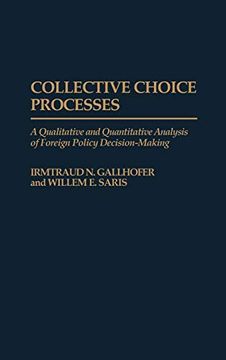Share
Collective Choice Processes: A Qualitative and Quantitative Analysis of Foreign Policy Decision-Making (in English)
Irmtraud N. Gallhofer; Willem E. Saris (Author)
·
Praeger
· Hardcover
Collective Choice Processes: A Qualitative and Quantitative Analysis of Foreign Policy Decision-Making (in English) - Irmtraud N. Gallhofer; Willem E. Saris
$ 108.57
$ 135.71
You save: $ 27.14
Choose the list to add your product or create one New List
✓ Product added successfully to the Wishlist.
Go to My WishlistsIt will be shipped from our warehouse between
Tuesday, June 11 and
Wednesday, June 12.
You will receive it anywhere in United States between 1 and 3 business days after shipment.
Synopsis "Collective Choice Processes: A Qualitative and Quantitative Analysis of Foreign Policy Decision-Making (in English)"
Gallhofer and Saris examine the collective choice processes in different decision-making units leading to World Wars I and II as well as the Cuban Missile Crisis, colonial wars, and to major foreign policy decisions of a European government after World War II. In the unit relating to the European government, they find strong evidence for consensual decision-making. But when disagreements occurred among the participants, alternative procedures were employed, such as postponements in order to search for additional information, shifts from argumentation to find a compromise, and change from consensus to majority decision-making. How quickly these shifts were made depended on the group norms.This book provides a theoretical framework to understand how different foreign-policy decision-making units or groups arrive at a collective choice. The qualitative and quantitative studies presented here are based on written records and deal with the choice process of four different decision-making units in situations that pertain to important foreign policy decisions. Germany's decision-making process under Hitler to initiate World War II exemplifies a group with a leader who is insensitive to advice, making the decisions himself and using the group only for acclamation. Kennedy's decision-making during the Cuban Missile Crisis is very different, as it shows a leader sensitive to advice where the group has the task of presenting different options and their consequences. The Austro-Hungarian cabinet's decision to initiate World War I exemplifies a homogeneous group with a dissenter, although it arrived at a collective decision quite quickly using persuasion, compromise, and some coercion. The bulk of the study deals with a heterogeneous unit in a great variety of decision situations, because most Western European governments are of this type. Where there is extreme conflict and time pressure, consensual decision-making is abandoned and a majority choice is hammered out.As the first systematic documented study of collective decision-making, as it pertains to different decision units, this book will be of considerable importance to scholars and researchers investigating the decision-making process in government and international affairs.
- 0% (0)
- 0% (0)
- 0% (0)
- 0% (0)
- 0% (0)
All books in our catalog are Original.
The book is written in English.
The binding of this edition is Hardcover.
✓ Producto agregado correctamente al carro, Ir a Pagar.

